| Article ID | Journal | Published Year | Pages | File Type |
|---|---|---|---|---|
| 5504862 | Biochemical and Biophysical Research Communications | 2017 | 9 Pages |
Abstract
Diabetes mellitus (DM) affects male reproductive system and causes infertility. The male reproductive health is largely dependent upon uptake and proper utilization of glucose by testicular cells. Results show involvement of orexin A (OXA) and its receptor (OX1R) in regulation of steroidogenesis and glucose homeostasis in adult mice testis. However, the role of OX1R in regulation of testicular functions during hyperglycemia has not been investigated so far. The present study, therefore, examined the role of OX1R in regulation of steroidogenesis and glucose homeostasis in testis of adult mice during alloxan-induced type 1 DM. A significant decrease was noted in body weight and testis weight in alloxan-treated mice compared to controls. The blood glucose level, however, was markedly increased in treated animals than in controls. Further, serum and intratesticular level of testosterone, activities of testicular steroidogenic enzymes, and expressions of various steroidogenic markers, OX1R, glucose transporter 3 (GLUT3) and Wilms' tumor gene (WT1) were downregulated in treated mice. The level of glucose, activity of lactate dehydrogenase (LDH) and lactate concentration in the testes of diabetic mice were also decreased; a significant increase in the number of testicular apoptotic cells with concomitant increase in the expression of caspase-3 was noted in these mice. Furthermore, DM affected germ cell proliferation with decreased expression of proliferating cell nuclear antigen (PCNA). Results thus suggest that type 1 DM impairs testicular steroidogenesis and glucose homeostasis through inhibition of OXA/OX1R signaling cascade due to decreased OX1R expression in adult mice, thereby affecting germ cell survival and their proliferation in the testis.
Related Topics
Life Sciences
Biochemistry, Genetics and Molecular Biology
Biochemistry
Authors
Deepanshu Joshi, Debarshi Sarkar, Shio Kumar Singh,
